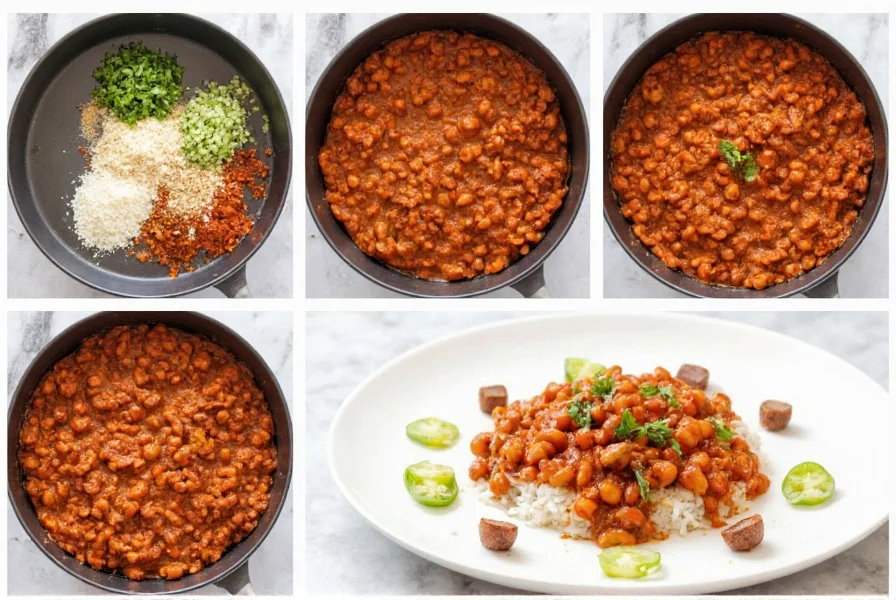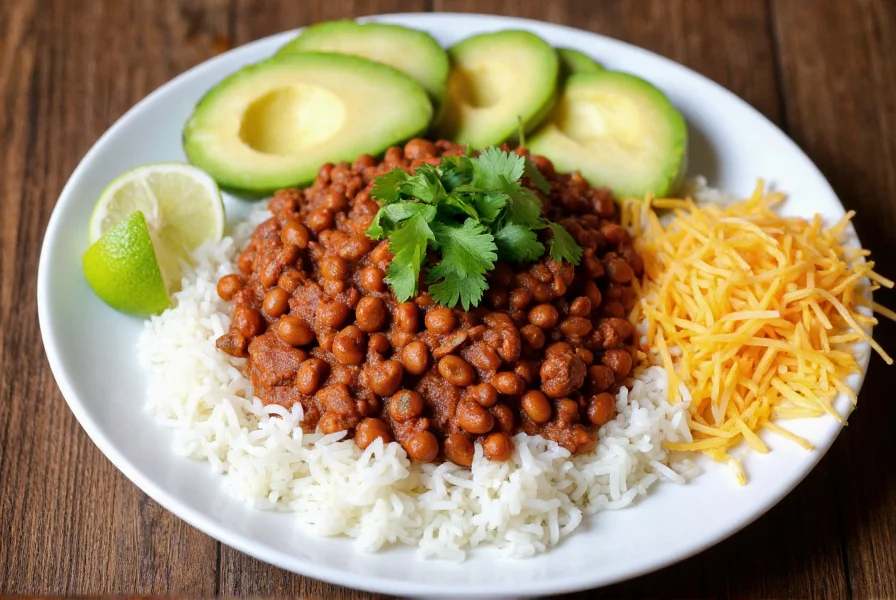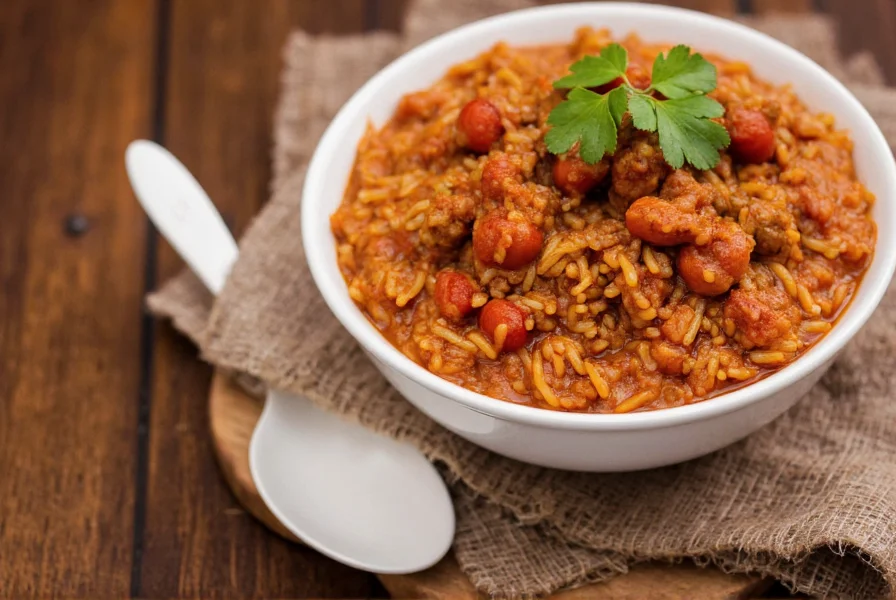The Essential Guide to Perfect Chili on Rice
Chili on rice represents one of America's most beloved comfort food combinations, merging the robust flavors of chili con carne with the neutral canvas of steamed rice. This dish has evolved from humble Tex-Mex origins to become a weeknight dinner staple across households seeking both convenience and flavor depth.
Historical Background of Chili on Rice
The marriage of chili and rice traces back to 19th century Texas, where Mexican and American culinary traditions intersected. Early versions featured chili powder-spiced meat stews served with whatever starch was available, often rice brought by immigrant communities. By the mid-20th century, chili on rice had become standard diner fare across the Southwest, eventually spreading nationwide through cookbooks and community cookery.
Key Components for Authentic Flavor
Creating exceptional chili on rice requires attention to both elements:
Chili Fundamentals
The foundation of any best chili on rice recipe starts with quality ingredients:
- Protein selection - Ground beef, turkey, or plant-based alternatives
- Bean varieties - Kidney, pinto, or black beans for texture contrast
- Chili seasoning blend - Cumin, paprika, garlic powder, and cayenne
- Liquid component - Tomato sauce or broth for proper consistency
Rice Preparation Techniques
Many home cooks underestimate how crucial proper rice preparation is for how to make chili over rice successfully. Long-grain varieties like jasmine or basmati work best as they maintain structure when topped with chili. The 1:1.5 rice-to-water ratio with 15 minutes simmering creates ideal texture that won't become mushy under chili.
| Rice Type | Water Ratio | Cooking Time | Best For |
|---|---|---|---|
| White Jasmine | 1:1.5 | 15 minutes | Classic chili pairing |
| Brown Basmati | 1:2 | 25 minutes | Health-conscious meals |
| White Long-Grain | 1:1.75 | 18 minutes | Everyday preparation |
Step-by-Step Preparation Guide
Follow these steps for restaurant-quality chili rice bowl variations at home:
- Brown your protein - Cook ground meat thoroughly, draining excess fat
- Sauté aromatics - Onions, garlic, and bell peppers until softened
- Add seasonings - Toast spices for 1 minute to enhance flavor
- Combine liquids and beans - Simmer for 20-30 minutes for flavor development
- Prepare rice separately - Cook using absorption method for perfect texture
- Assemble thoughtfully - Place rice first, then ladle chili over top
Popular Chili on Rice Variations
Modern interpretations of chili over rice meal prep include:
- Tex-Mex Style - With corn, black beans, and avocado topping
- Vegetarian Version - Using lentils and multiple bean varieties
- Korean-Inspired - Gochujang-infused chili with sesame seeds
- Breakfast Adaptation - With eggs and chorizo for morning meals

Achieving Perfect Balance in Every Bite
The secret to exceptional chili served over rice lies in balancing components. Your chili should have enough liquid to moisten the rice without making it soggy. Aim for chili that holds its shape when spooned but has sufficient sauce to coat each grain. The ideal ratio is approximately 1.5 cups chili to 1 cup cooked rice.
Common Mistakes to Avoid
Even experienced cooks make these errors with chili on rice dinner ideas:
- Overcooking the rice - Results in mushy texture that can't support chili
- Underseasoning the chili - Fails to complement the neutral rice base
- Serving immediately - Let chili rest 10 minutes for flavors to meld
- Skipping acid elements - A squeeze of lime brightens the entire dish
Serving Suggestions and Pairings
Elevate your easy chili on rice recipe with these finishing touches:
- Fresh cilantro or scallions for color contrast
- Lime wedges for brightness
- Avocado slices for creamy texture
- Shredded cheese for richness
- Sour cream to moderate heat levels

Storage and Reheating Guidelines
For meal preppers exploring chili on rice meal prep, proper storage maintains quality:
- Store components separately in airtight containers
- Refrigerate for up to 4 days or freeze for 3 months
- Reheat chili gently on stove with splash of water
- Fluff rice with fork after reheating to restore texture
Frequently Asked Questions
What type of rice works best for chili on rice?
Long-grain white rice varieties like jasmine or basmati work best for chili on rice. These maintain their structure when topped with chili while providing a neutral flavor base. Avoid sticky rice varieties that become too soft when combined with chili's liquid content.
Can I make vegetarian chili on rice with the same texture as meat versions?
Yes, you can achieve similar texture in vegetarian chili on rice by using a combination of beans, lentils, and textured vegetable protein. Mushrooms and walnuts add meaty texture, while tomato paste and liquid smoke provide depth. Simmering time is crucial—vegetarian versions need 25-30 minutes to develop proper consistency.
How do I prevent my chili on rice from becoming soggy?
To prevent soggy chili on rice, cook the rice separately using the absorption method and let it rest covered for 10 minutes after cooking. Serve the rice first, then ladle chili on top rather than mixing them together. Your chili should have a thick, stew-like consistency—not too runny—before serving over rice.
What are the best toppings for chili on rice?
The best toppings for chili on rice include fresh cilantro, lime wedges, avocado slices, shredded cheese, and sour cream. For added texture, consider crushed tortilla chips or toasted pumpkin seeds. Acidic elements like pickled onions or a dash of hot sauce help balance the richness of the chili.











 浙公网安备
33010002000092号
浙公网安备
33010002000092号 浙B2-20120091-4
浙B2-20120091-4